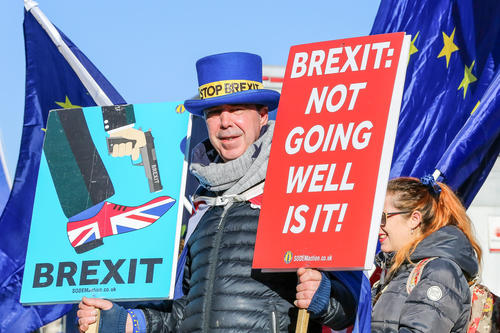When Coalitions Crumble
Simon Koschut studies why cohesion among countries experiences crises. He believes the risks that could cause alliances like NATO to break down are very real indeed.
Mar 13, 2019
A staunch proponent of Europe: Steven Bray, founder of SODEM (Stand of Defiance European Movement) demonstrates against Brexit daily in London.
Image Credit: picture alliance/Dinendra Haria
The UK, one of Europe’s core countries, is slated to leave the European Union, probably at the end of March. And Donald Trump, an American President, of all people, has cast doubt on the reason for the North Atlantic Treaty Organization (NATO) to exist. He is also risking a trade war with the country’s European partners. The tone between countries that have been partners for decades is increasingly fraught.
“Just a few years ago, it seemed unthinkable that cohesion among Western security alliances could ever seriously be in question,” says Simon Koschut. “Today, the risks that could cause these alliances to rupture are very real indeed.”
Koschut, a political scientist, is currently teaching at the Otto Suhr Institute at Freie Universität Berlin as a visiting professor. The German Research Foundation (DFG) granted him a Heisenberg fellowship in 2018. Koschut has been working on the disintegration of security communities since 2010. He studies how and why peaceful cohesion among countries falls into crisis and once-successful alliances break apart.
Decline of Shared Norms a Crucial Factor
For his book Normative Change and Security Community Disintegration. Undoing Peace, Koschut was awarded the Ernst Otto Czempiel Award by the Peace Research Institute Frankfurt (PRIF) last year. The book studies two cases of disintegration.
The first of them is the German Confederation, the German-Austrian confederation of states that existed from 1815 to 1866 and ultimately gave rise to the German and Austro-Hungarian Empires when it collapsed. Koschut compares this historical case to the situation of NATO in the early 2000s, when the alliance was strained by the American and British invasion of Iraq.
Koschut’s key insight is that the crucial factor in the disintegration of security communities is the decline of shared norms. Only when values are shared and jointly agreed rules are followed can communities continue to exist in the long term, he explains. “It’s hugely important for these shared norms to have support in society,” Koschut points out.
One of the main reasons the German Confederation – which was formed as a conservative, monarchist bulwark against the ideas emerging from the French Revolution – fell apart was that it was unable to integrate bourgeois segments of society and their national and liberal ideas in political terms. “NATO, on the other hand, managed to hold things together at the time,” Koschut says. “There was a heated debate among the partners, but the shared normative foundation was never in doubt.
In his work, Koschut identifies three fundamental norms in the transatlantic alliance. The first is the members’ shared values – first and foremost the rights and liberties afforded by democratic market economies and the United Nations Universal Declaration of Human Rights . The second norm is a belief in multilateral action, the idea that no partner will act alone in the event of conflict, but rather that everyone will strive to achieve a peaceful solution. The third and final one is shared communication. “The goal is not just to inform other partners of political decisions that have already been made, but also to take the other party’s interests into account,” Koschut explains. “That’s what the North Atlantic Council decided.”
Current Situation Is Serious
With his research findings as background, Koschut views the current political situation as serious. “Unlike during the crisis in the early 2000s, the normative foundation of NATO is under pressure today,” he explains. “And not just in one normative category, but across all three.” One especially alarming aspect is that it is the United States specifically – the architect and previously the most important guarantor of the transatlantic partnership – that is increasingly violating shared norms.
But Koschut’s research also shows how much power citizens have to shape the course of events. Whether shared norms hold up or a change takes place, he says, is something that is decided not by political elites, but rather the center of society. “And on that point, surveys have shown that NATO enjoys great support across broad swaths of the population in the United States and Europe,” Koschut says. As long as that remains the case, he does not think NATO’s existence is in danger.
“For the European Union, the situation is a bit more precarious, though,” he says. “It is a known fact that approval ratings have been declining in some Member States, in some cases to a significant degree.” That in turn, Koschut says, means there is even greater need for European institutions to take action, bringing citizens of the EU along with them as events take shape. Sparking greater enthusiasm for the European project, or restoring enthusiasm that has faded, among the people of Europe will be vital to the continued success of the European Union.
“We have to create a collective awareness of how much of a public good was created by establishing reliable peace between European states,” Koschut says. “We need to advertise it more.” What if one of these alliances should break down someday? “That would be bad, but it doesn’t have to be the end of the world,” Koschut says. In the case of the German Confederation, for example, the German nation-state emerged from the rupture. “The collapse ultimately brought more integration, in a way.”
This text originally appeared in German on February 23, 2019, in the Tagesspiegel newspaper supplement published by Freie Universität.
Further Information
Prof. Dr. Simon Koschut, Otto Suhr Institute of Political Science, Freie Universität Berlin, Tel.: +49 30 838 75792, Email: simon.koschut@fu-berlin.de

